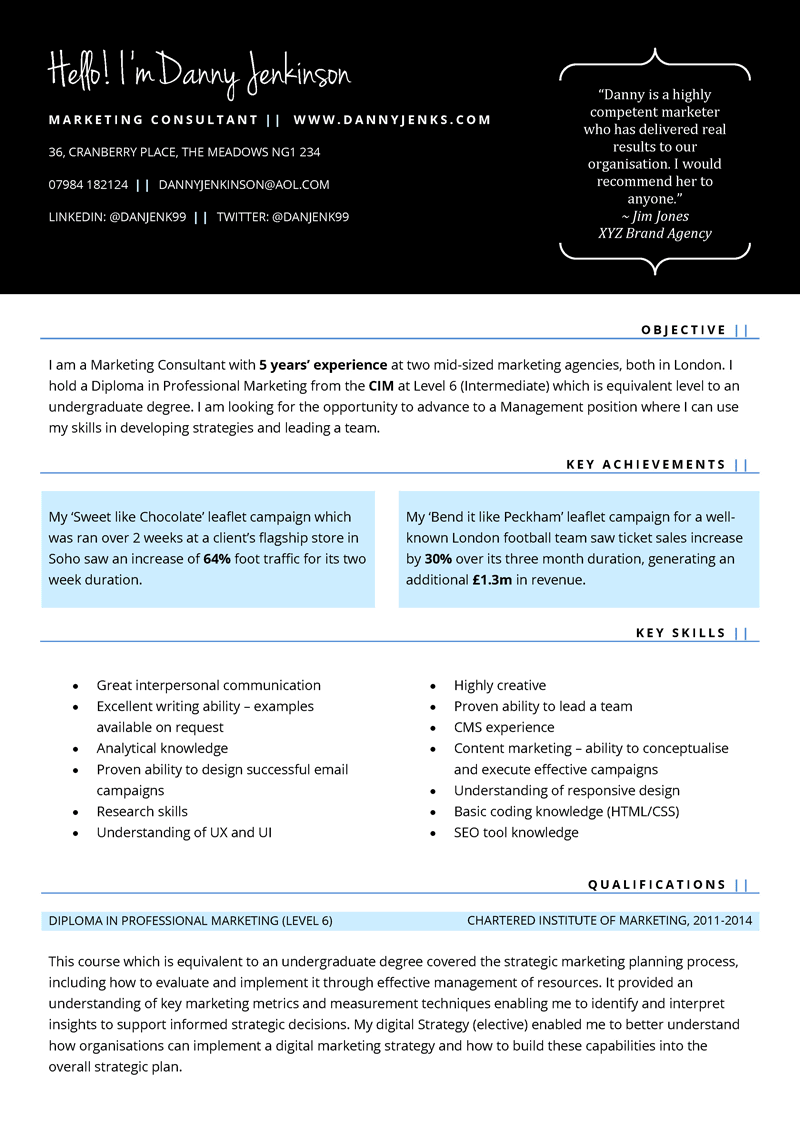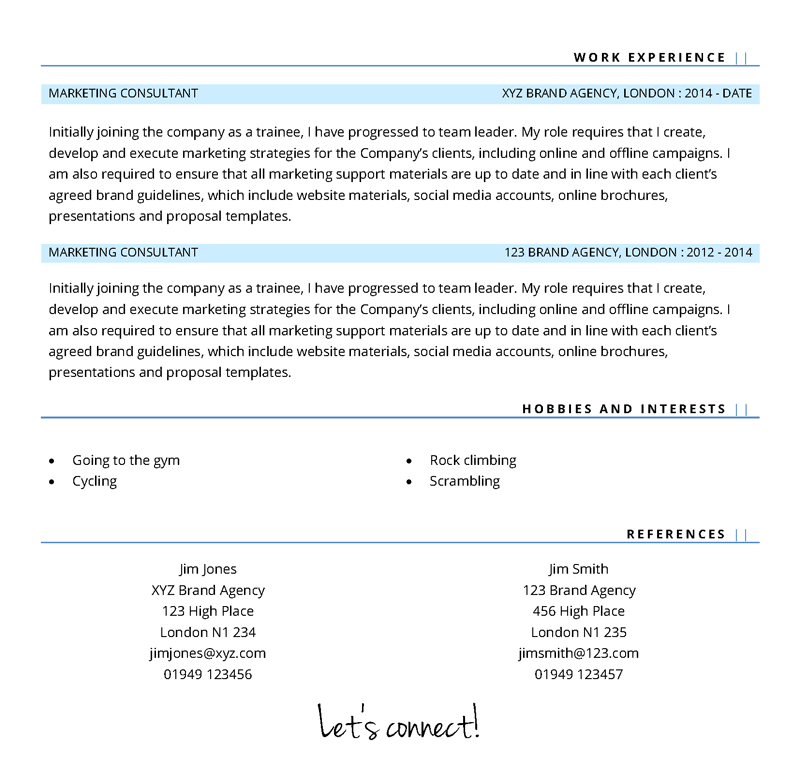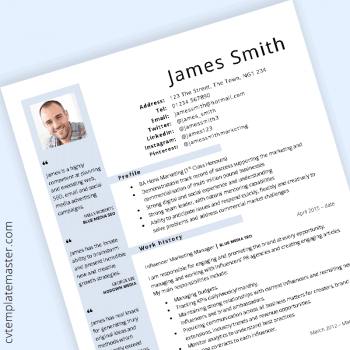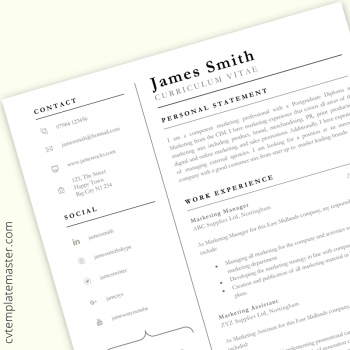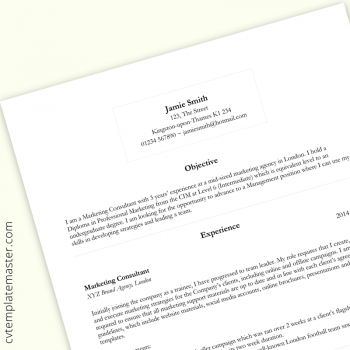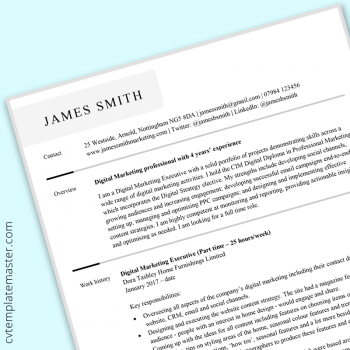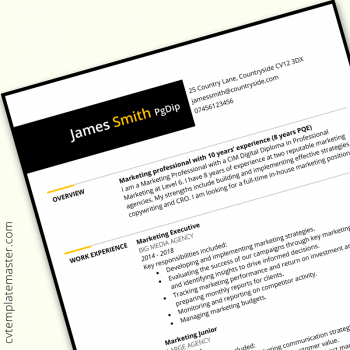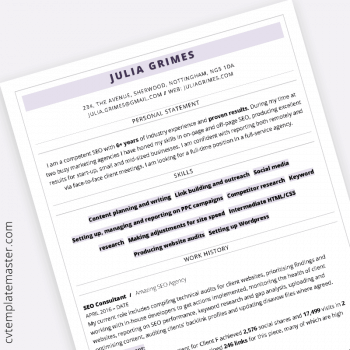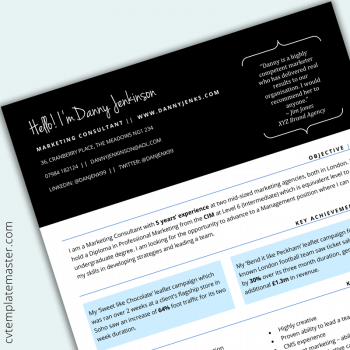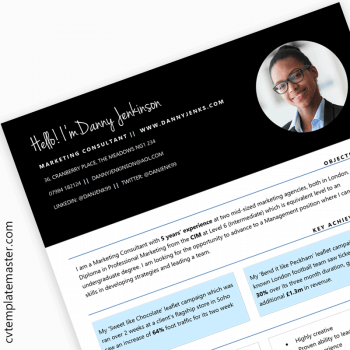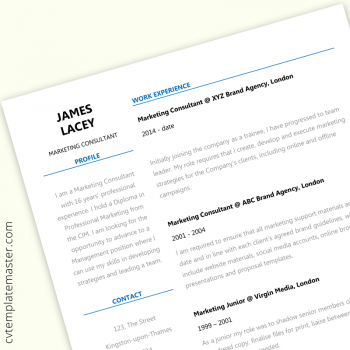How to write a marketing CV
Whether you’re a marketing junior or assistant, a digital marketing expert or a marketing manager looking to update their CV, this guide will help you write a better CV.
Marketing CV basics
Your CV should contain the following sections:
- Name (first and last)
- Contact details
- Personal statement
- Skills
- Work experience
- Education
- Professional memberships (optional)
- Publications (optional)
- Interests
- References
- Mini portfolio (optional)
Contact information
Contact information should include:
- Address
- Phone number(s)
- Email address
- “Full clean driving licence” (if applicable and relevant)
You should not include any other personal information here at all.
In addition, you should provide details of your LinkedIn and Twitter profiles – but why?
Social profiles – why bother?
It’s all very well having a Marketing Degree or CIM qualification but a key concern for those hiring marketers is whether candidates’ knowledge is up to date. Marketing channels – social, for example – are constantly evolving and adding new features. For digital marketers, algorithms can change by the day. Legislation changes, as does best practice. For this reason, you must show that you’re right at the forefront of the marketing industry when it comes to your knowledge.
As a marketing professional, you’ll be expected to include details of your LinkedIn and Twitter profile as a minimum. Your LinkedIn page should expand on your CV and may contain recommendations or endorsements to further boost your profile. It is also an opportunity to show that you’re publishing relevant commentary about changes within the industry and contributing to the discussion. Similarly, your Twitter profile should show that you’re active and engaged within the marketing community. If you post relevant content (such as examples of your work) on Instagram, you may like to consider including your Instagram details as well.
Check out your target company
Before you start writing the body of your CV, take the time to research the company that you want to work for. Your first stop is the job advert which will very often include a short company bio and person specification. This will reveal a lot about the marketing company is looking for – but to get a competitive edge, you’ll need to dig deeper. Look up your target company’s website, check out their LinkedIn, Facebook, Twitter, YouTube and Instagram accounts, analyse any other channels that they’re using and understand exactly how the company positions itself. This will put you in a good position to present yourself in a way that is attractive to the company.
Shooting high? Choose an ATS-friendly template
Not every company uses ATS software to analyse their applications but there’s a good chance larger companies will. ATS software scans CVs and filters promising applicants, discarding the rest. If, therefore, you don’t play by the ATS-rules, your CV can end up on the rejection pile – even if it ticks all the boxes.
You can find ATS-friendly CV templates here. If you’re not sure whether such a system is in use, call up the HR department and ask.
You may find our guides helpful when writing your CV or resume with ATS software in mind:
The main things to keep in mind are to use an ATS-friendly template, and to use the exact keywords that you see in the job advert. So if your job titles have been changed to something fancy and creative (as is often the case in this industry!), don’t be afraid to change them back to the boring version to ensure the software can pick up that experience.
Write a punchy personal statement
Your personal statement is a short introduction which summarises who you are, how you’re the right person for the role and what you’re looking for.
You’re a marketing professional so your personal statement should market you in the best way possible. What makes you the best choice? Remember that when it comes to selling yourself, the job advert is your best friend – it tells you exactly which skills and experience are most important to the recruiter. Pick out keywords from the ad and use them to make it clear you meet the main requirements.
If the advert is a little sparse in detail, have a look at the career profiles on Prospects. This will give you a good idea of what a typical recruiter is looking for in relation to your area of expertise. You can then ensure that the most important skills relevant for the job are highlighted in your personal statement (you’ll expand on these later).
Work experience
As you detail your work experience, remember that in marketing it’s all about the bottom line. Whilst it’s wonderful that you can put together a super creative, visually stunning advert, nobody will care unless you can show results. Using the right words throughout your work experience section can help guide you towards providing clear examples of what you’ve achieved.

Education
The education section of a marketing CV is pretty self explanatory. If you don’t have any marketing-specific qualifications, do highlight any that demonstrate creativity such as art and design, together with core skills such as English and Maths.
Professional memberships
The optional professional memberships section should contain details of any relevant organisations that you’re a member of, together with your grade of membership (e.g. student, affiliate, full member). Advertising, marketing and PR bodies in the UK include:
- Advertising Association
- Chartered Institute of Marketing
- Chartered Institute of Public Relations
- Direct Marketing Association
- Institute of Direct Marketing
- Institute of Practitioners in Advertising
- Institute of Promotional Marketing
- Internet Advertising Bureau
- Market Research Society
- Marketing Agencies Association
- Public Relations Consultants Association
Being a member of a professional organisation suggests an interest in the industry and in your own continued personal development.
Publications
Marketers are often asked to contribute articles to websites, blogs and publications. In addition, you may have a number of articles that you’ve written for your own sites or for LinkedIn. These are a great way to further demonstrate industry expertise in addition to showcasing your written communication skills.
Alternatively you can mention articles where you’ve provided commentary to the author.
Interests
The interests section can add further value to your CV, showing prospective employers that you have certain traits they’re looking for. It can demonstrate valuable soft skills such as leadership and teamwork (e.g. sports), or show you take an interest in your well being (fitness). It can show your creative side (arts, crafts, drama) or demonstrate that you can take responsibility (community projects, volunteering). Last but not least, it’s a way to make your application more ‘human’, show that you’re interesting and provide talking points for your interview.
References
It’s usual to provide two references, one of which should be your current employer. The second reference could be a past employer or someone within the industry that knows your work. A respected name here can go a long way (but make sure you ask them first!)
In addition to providing the contact information for your two references, you may want to provide some ‘endorsements’ from industry authorities about your work. These are just short 2 or 3 line quotes from people who can essentially vouch for you.
Mini portfolio
Employers like you to show rather than simply tell and in the marketing industry, that’s easy. Although your CV should be no longer than two pages, it’s fine to attach an extra page or two with extracts from your work – a ‘mini portfolio’. Try to make these visually appealing and not too text-heavy, so the recruiter doesn’t feel swamped with printed information. Where possible, explain in a few words what you have included and the success of each campaign.
Example marketing CV
Here’s an example of a marketing CV that you can download for free here. You can also find our full collection of free CV templates here.
